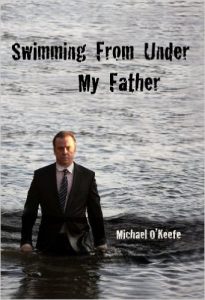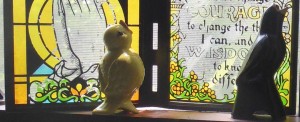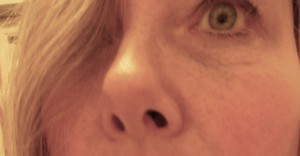first published in “Through the Red Door,” the blog for Recovery Ministries of the Episcopal Church.
Headed out the door, late as usual, I paused with my hand on the key. The neighbor’s cat was immobile on the front porch, deathly still, ready to strike. My eyes sought out his prey. After a moment, I saw it: a lizard or green anole, just three inches long. It was a dusty, unremarkable brown, still as a stone, about three feet off the ground. It was out of reach of the cat, but was it aware that it was safe? Looking closer, I saw its throat was pulsing rapidly, and it looked like fear to me.
When I am fearful, anxious, out of control, I forget to breathe and lose my focus, paralyzed by the threat I am so certain is about to pounce. Then I am best served by stillness, because that’s how I sometimes discover how to act, think and become what my Higher Power has in mind for me.
How ironic, that the apparent source of its salvation at that moment caused even more distress.
My first impulse was to rescue the lizard from the fanged, clawed predator, but some instinct or maybe just curiosity stilled my movement. I stopped and witnessed the stand-off, a miniature high  noon, completely inconsequential except to the three-inch anole. For the lizard, it was literally a life-or-death situation, and I wonder now: did those few seconds feel like an eternity to the cold-blooded creature?
noon, completely inconsequential except to the three-inch anole. For the lizard, it was literally a life-or-death situation, and I wonder now: did those few seconds feel like an eternity to the cold-blooded creature?
Then, because of impatience or a short attention span or a desire to look like a responsible adult who owns a clock, I twisted the door knob. The cat, quite accustomed to my comings and goings, barely flickered an ear. The chameleon’s throat seemed to pulse even faster. How ironic, that the apparent source of its salvation at that moment caused even more distress.
I told the cat, quite nicely, to leave the poor beastie alone for the time being, and Rocket complied with feline aplomb. That is, he ignored me for a leisurely beat or two before strolling a few feet away and burying his nose between his long, upthrust legs.
I stood on the threshold and watched the lizard. The fresh air reminded me to breathe, and the deep stillness of the creature gave me a little jolt of joy. As I watched, and breathed, and remembered to be grateful, an electric, vibrant green crept from one end to the other of the chameleon, a transformation so soothing, so astonishing, so poignant I gasped – and just like that, the lizard disappeared.
When I came home hours later, no sign of the lizard. But Rocket, my neighbor’s cat, was sprawled across my front step, and deigned to allow me the pleasure of sinking my fingers in his silky, warm belly fur. He purred, and it was as if we had never held the balance of a tiny life in our control. Perhaps we never did.






